Iliad
Iliad: Homer's famous epic about the wrath of Achilles, the main poem of the Epic Cycle, and the beginning of Greek literature.
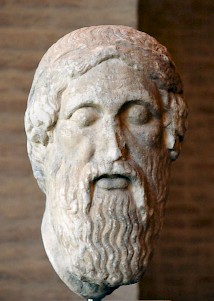
The Iliad is the sixth epic of the Epic Cycle; it is attributed to the legendary bard Homer. The story, an episode from the Trojan War, was well-known to any Greek or Roman, and had a status almost comparable to a sacred book. Reportedly, Alexander the Great slept with a copy of the Iliad under his pillow (text), and if we find it hard to believe that story, it remains a testimony to the importance of the text that the ancients found it credible. Poets like Apollonius of Rhodes and Virgil wrote imitations. Appian of Alexandria tells that when Scipio Aemilianus destroyed Carthage, he quoted a line from the Iliad ("the day shall come in which our sacred Troy shall perish", 6.448-449; Punic War, 132). The Iliad was represented on works of art, found in Bactria, Egypt, or Germania Inferior. The poem was everywhere.
Contents
A quarrel about the two girls mentioned at the end of the Cypria marks the beginning of Homer's great epic. Chryseis is the daughter of Chryses, the priest of Apollo Smintheus; he wants to buy his daughter - taken captive by the Greeks who are besieging Troy - back. When the Greek supreme commander Agamemnon refuses, Chryses invokes his god, who answers this prayer and strikes the Greeks with plague. Agamemnon is now convinced that he acted wrongly, returns the girl, and demands Briseis from Achilles. The great warrior feels insulted and decides not to fight any longer. Thus begins the story of the wrath of Achilles.
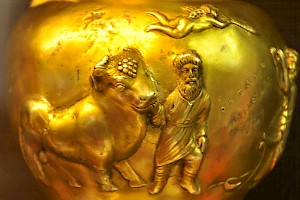
The gods have decided to honor Achilles: the Greeks will feel that their best fighter is absent. To achieve this, a dream is sent to Agamemnon, who becomes convinced that he will win a victory. He orders his troops to prepare themselves for battle, and there is a long catalog of batallions in the second half of Book 2 (the "Catalog of Ships"). A second list enumerates the units that were fighting in the Trojan army. Battle commences, and during this fight, Paris and Menelaus fight a duel: the Trojan prince has once captured Helen, Menelaus' lawful wife. Menelaus is victorious, but Paris is protected by Aphrodite, who takes him away from the field.
The fight between the armies is resumed, and we hear how the Greek Diomedes performs great deeds of heroism. He is supported by Athena, who hates the Trojans since Paris had insulted here when he said Aphrodite was more beautiful. Diomedes kills many enemies, and in the end even wounds Aphrodite, who flees to the Olympus. Several other fights are mentioned, including one between the Greek champion Ajax and the Trojan prince Hector, which takes place after Hector has said goodbye to his wife Andromache and their son Astyanax. It is a classic piece of irony: the listener knows that all hopes that the parents express, will be in vain. Nevertheless, Hector fights well and he is able to stop the Greek advance, fighting a duel with Ajax that ends when the sun sets.
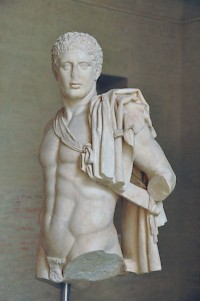
After negotiations - Paris offers restitution, but does not want to give up his Helen - the fight continues on the next day, and the Trojans achieve spectacular successes: they drive back the Greeks within the walls of their camp. Now that the besiegers have become the besieged, Agamemnon regrets his falling out with Achilles and sends an embassy to his best fighter, but Ajax and Odysseus, although received politely, return empty-handed.
During the night, Odysseus and Diomedes leave the camp to spy on the Trojans, and they meet Dolon, a Trojan warrior who is also on an information gathering mission. Afraid, he tells them everything they want to hear, and is killed.
Next day, both Agamemnon performs great deeds, but Hector's army is more successful and the Trojans reach the wall of the Greek camp, and although Zeus has forbidden the gods to join the fight, Poseidon and Hera (who has deceived her husband) support the Greeks. Hector is wounded. Still, things are not going well for the soldiers of Agamemnon. Achilles sends his friend Patroclus to the aged Nestor, to ask how the fight is going; Nestor explains that things are going badly, and requests for the help of Achilles' men.
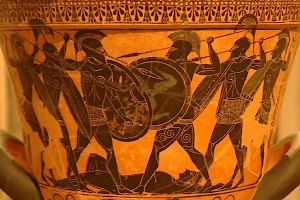
Meanwhile, the Trojans have breached the Greek wall and have entered the camp, where Hector, following an advise of Apollo, sets the ships afire. Now that things are going completely wrong, Achilles allows Patroclus to use his armor, and repel the Trojans. Under no circumstances, the substitute Achilles is allowed to fight against Hector. Patroclus obeys, puts the Trojans to the flight, and is even capable of killing Sarpedon, a son of Zeus fighting in Hector's army.
Then, the inevitable happens: Patroclus and Hector meet in battle, an encounter that Patroclus does not survive. Hector strips his dead enemy from Achilles' panoply, and a big fight breaks out for the possession of the corpse. In the end, Menelaus is able to keep it in Greek hands. When Achilles is informed about the death of his friend, he is very angry, decides to avenge Patroclus, and redirects his wrath: he will reconcile himself with Agamemnon and kill Hector, even though he knows that he will not survive this ultimate victory.
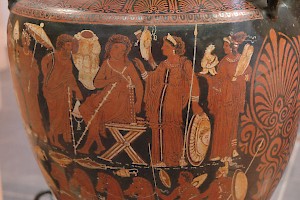
Of course, he needs new weapons and a new armor. His mother Thetis visits Hephaestus, the god of the smiths, who forges a new panoply, which Homer describes in great detail: it consists of several rings, which represent almost the entire universe: in the center is the sky, at the edge is the Ocean, and between them is earth, divided into city and countryside, which is again divided into work and festivities, while urban life is subdivided into war and peace. This part of the Iliad has become the classical example of an ekphrasis: a long description of an artwork that is a comment upon the main story. In this case, it shows what will be lost when Troy is sacked - no agriculture, no peaceful city, not even a city capable of fighting its own wars.
Agamemnon and Achilles are reconciled and the war is renewed, even the gods taking part in it. Achilles is, by now, like a machine, massacring everyone he meets, and leaving so many corpses that the river Scamander complains. Achilles wants to fight somewhere else, but still has to cross the river, which makes the river god very angry, and causes another, terrible fight. In the end, however, Achilles meets Hector, kills the man who has killed Patroclus, and drags his corpse to the Greek camp.
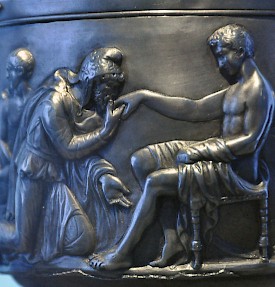
We hear about the funeral games that Achilles organizes to commemorate Patroclus; the great warrior even sacrifices twelve Trojan princes to the spirits of his dead friend. And for ten days and nights, Achilles binds Hector's body behinds his chariot, riding around Troy, mutilating the corpse. Then, the gods intervene: the messenger Iris is sent to king Priam, who is requested to secretly go to the Greek camp and ask the body back, and Thetis visits her son Achilles, and orders him to release it. During the night, Priam enters the Greek camp, and speaks to Achilles, who is reminded of his own father, and understands the cruelty of war.
Priam returns to Troy, and during an armistice, Andromache predicts that her little son Astyanax will never succeed Priam and that the women will be sold. Helen commemorates that she has left her husband twenty years before and has since been living in Troy, but has, in all those years, only received kind words from Hector. For nine days, the Trojans gather wood, and they erect a large funeral pyre for their dead hero. On the tenth day, they cremate their prince. Thus, Homer ends his story, they buried Hector, the tamer of horses.
The Iliad as poem
The Iliad consists of 15,693 hexameters, which betray that it was originally an oral composition. Already in the fifth century, subunits were recognized, like the "embassy to Achilles" (the litai), Hera's seduction of Zeus (the Dios apate), and the fight at the wall of the Greek camp (the teichomachy). The division into twenty-four books is from the fourth or third century BCE.
The name Iliad, "events at Troy", which is a poor indication of the contents ("the wrath of Achilles"), can be found for the first time in Herodotus' Histories.note It is possible that Iliad was originally the name of all Trojan poems in the Epic Cycle, and that the epic on the wrath of Achilles became recognized as the quintessential part of the cycle (a totum pro parte). Certainty cannot be achieved.
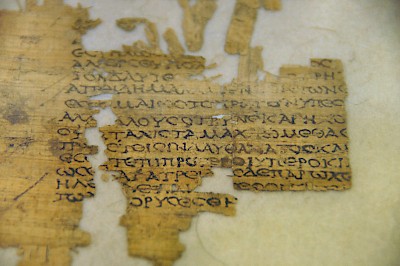
The Iliad is hard to date, but the depicted society seems to be datable to the late eighth, early seventh century BCE, when the Greek cities started to grow and old ideas and values were no longer self-evident. The Iliad is essentially about the question what it means to be an aristocrat: one has to be a brave warrior, one has to be pious, one has to be generous, and most of all, a leader had to be able to control his anger. Perhaps the crucial line is this one:
... Godlike Sarpedon's spirit drove him then
to assault the wall, break down the parapets.
He called to Glaucus, Hippolochus' son: "Glaucus,
why are we two awarded special honors,
with pride of place, the finest cuts of meat,
our wine cups always full in Lycia,
where all our people look on us as gods?
Why do we possess so much fine property,
by the river Xanthus, beside its banks,
rich vineyards and wheat-bearing ploughland?
It's so we'll stand in the Lycian front ranks
and meet head on the blazing fires of battle,
so then some well-armed Lycian will say,
'They're not unworthy, those men who rule Lycia,
those kings of ours. It's true they eat plump sheep
and drink the best sweet wines - but they are strong,
fine men, who fight in the Lycians' front ranks.'
Ah my friend, if we could escape this war,
and live forever, without growing old,
if we were ageless, then I'd not fight on
in the foremost ranks, nor would I send you
to those wars where men win glory. But now,
a thousand shapes of fatal death confront us,
which no mortal man can flee from or avoid.
So let's go forward, to give the glory
to another man or win it for ourselves."[Iliad, 12.307-330; tr. Ian Johnston]
"With great power," as a superhero of our own age would say, "comes great responsibility".